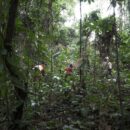Tunis: Party time – By Richard Dowden


Youssou Ndour performs at the Mo Ibrahim Prize awards ceremony in Tunis - photo courtesy of Portland Communications
I spent last weekend in Tunis to attend the Mo Ibrahim Prize ceremony and the attendant conference on agriculture. The $5 million prize is for an African leader who is elected, rules well and steps down when his term ends. Unawarded for the past two years for lack of candidates, it went this year to the former President of Cape Verde, Pedro Verona Pires. He is a small, unassuming man and he made a modest but tough acceptance speech pointing out global injustice. He certainly had the democratic credentials to qualify for the prize but some may wonder about the relevance to the continent of these ten small islands off the west coast of Africa, population – just over half a million.
In fact Cape Verde was the birthplace of Amilcar Cabral, one of Africa’s most inspirational independence leaders. His parents were from Guinea Bissau and he founded the movement demanding independence from Portugal. He became one of the most influential independence leaders. Pires was one of his followers and his speech in Tunis was laced with 1960s revolutionary rhetoric. Cape Verde and Guinea Bissau on mainland Africa became independent as one nation in 1974 but they separated on very different trajectories after a coup in Guinea Bissau in 1980. While Cape Verde’s leaders, like Pires, put their energies into creating a better life for its people, Guinea Bissau is now a narco state and one of the poorest – and nastiest – countries in the world.
Mo Ibrahim has a knack of mixing serious business with celebration and fun. On Sunday we had to be up early for a high powered conference on the future of agriculture in Africa. But Saturday night was party time. Mo has attracted a diverse group of friends and supporters. He brought along two of Africa’s biggest rock stars – Youssou Ndour and Angelique Kidjo – to sing at a huge open concert for the Tunisian people and then at the prize giving ceremony. At the end of the evening they called up everyone onto the stage to dance and I found myself between Mary Robinson, the former Irish president, and George Soros.
It is strange and wonderful to be in a country where everyone is happy. I stayed on a day to talk to Tunisians I had met at the conference. Free from the greedy repressive 23-year dictatorship of Ben Ali, the “nice guys of North Africa” as the Tunisians see themselves, just cannot stop smiling whenever you ask them how things are now. I hope this is not a false honeymoon. On paper it looks good: a moderate “Turkish-style” Islamic party, Ennahda, in coalition with the two secular parties Ettakatol and Congress for the Republic. They are tasked with drawing up a new constitution. But many of the politicians in these parties have not lived in Tunisia in recent years. The students who overthrew Ben Ali are barely represented in the new government. Yet they still throng the Avenue Bourgiba and the bars in the surrounding streets. You felt the intense buzz as they talk animatedly, enjoying their new freedom, watching developments closely. What will happen if they disagree with the government? That’s one possible fault line. The other is that woman are worried that even the moderate Islamists may start to squeeze them out of public life and the workplace.
But for the moment Tunisia must be the happiest country on the planet.
A Congolese Epic
Jason Stearn’s Dancing in the Glory of Monsters is a brilliant book on the war in Congo. I followed that war as closely as I could from London with occasional forays into that cursed country including a three day trip in a dug-out canoe down the Ubangi River to visit the site of a massacre. But I didn’t know the half of it. This book answers a lot of the vital questions: what is the connection with the Rwandan genocide and what role did Rwanda, Uganda and Angola play in creating today’s murderous chaos in Eastern Congo? Who murdered Laurent Kabila and why? Stearns gets close to former fighters, victims and witnesses, and tells their often horrific stories. Then he pulls back to make cool and generous judgements.
He points out that 800,000 died during the fastest genocide in history when the Rwandan Tutsis and some Hutus were slaughtered in Rwanda in 1994. The Rwandan Tutsis then murdered some 80,000 Hutus who had fled into Congo. No one knows the real figure. Yes, more Tutsis were killed in the genocide but the subsequent wars in Congo have killed some 4 million people, directly or indirectly over the next few years. And it is still going on. Will next week’s election be a turning point when Congo gets a decent and effective government?
The heroes are small people. The rulers come out badly. I would love to see honest responses from him and Presidents Kagame and Museveni to this book. All those who see Rwanda as the New Jerusalem and Paul Kagame as the saviour of Central Africa should read it.
Richard Dowden is Director of the Royal African Society





